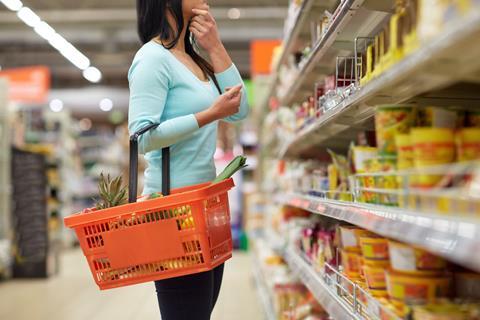One quarter of British shoppers struggling as grocery price inflation goes above 17 per cent for the first time

UK grocery price inflation rose again in the four weeks to 19 February 2023 to reach 17.1 per cent – the highest level ever recorded by Kantar.
The retail data and insights analyst said February marked a full year since monthly grocery inflation climbed above 4 per cent and this rise is having a big impact on consumers.
Supermarkets are adapting to manage rising prices, Kantar said, and the battle to offer best value for consumers continues in this intensely competitive sector, particularly as the traditional retailers look to protect market share from the discounters.
Shoppers too are modifying their habits, the analyst said, with own label ranges being consistently bought over brands since February last year. Sales of these lines are up by 13.2 per cent this month, well ahead of branded products at 4.6 per cent – a trend that shows little sign of stopping.
“Our latest research shows that grocery price inflation is the second most important financial issue for the public behind energy costs, with two-thirds of people concerned by food and drink prices, above public sector strikes and climate change,” said Kantar’s head of retail and consumer insight, Fraser McKevitt.
”One quarter say they’re struggling financially, versus one in five this time last year. The numbers speak for themselves. If people don’t change how they buy their groceries, households are facing an £811 increase to their average annual bill.”
Over the last week, shoppers have also been navigating shortages in the fruit and vegetable aisles as supermarkets restrict the number of salad and vegetable packs customers can buy due to supply chain issues.
”Though not captured in this data set, we’ll be closely following the impact of these shortages on sales in the coming weeks,” said McKevitt.
”While 43 per cent of all grocery baskets contain at least one fresh produce item, pack limits are unlikely to drastically affect consumers as we usually buy fruit and veg in smaller quantities. For instance, only 1 per cent of tomato purchases last year involved more than three packs.”
In terms of retailer performance over the four weeks to 19 February, Aldi pushed its market share to a new record this period hitting 9.4 per cent, according to Kantar data. It remains the fastest growing grocer, with sales up by 26.7 per cent. It was closely followed by Lidl which increased sales by 25.4 per cent. Lidl’s share of the market now stands at 7.1, Kantar said.
Frozen food specialist Iceland also won share, taking 2.4 per cent of market sales, up from 2.3 per cent last year as spending through its tills increased by 10.8 per cent.
Ocado put in a strong performance, bucking the overall trend in online sales. While online fell by 0.9 per cent over the 12 weeks, the digital specialist grew sales by 11.3 per cent to achieve its largest ever market share of 1.9 per cent.
Tesco edged slightly ahead in the battle between Britain’s biggest retailers, with sales up by 6.6 per cent. Sainsbury’s and Asda were just behind with sales rising by 6.2 per cent and 5.9 per cent respectively.
Morrisons’ sales decline of 0.9 per cent was its best performance since May 2021. Waitrose returned to growth, nudging up sales by 0.7 per cent. It has a market share of 4.7 per cent, Kantar said.
Convenience retailer Co-op increased sales by 3.4 per cent, while independents and symbols were up by 1.8 per cent, Kantar data showed.



